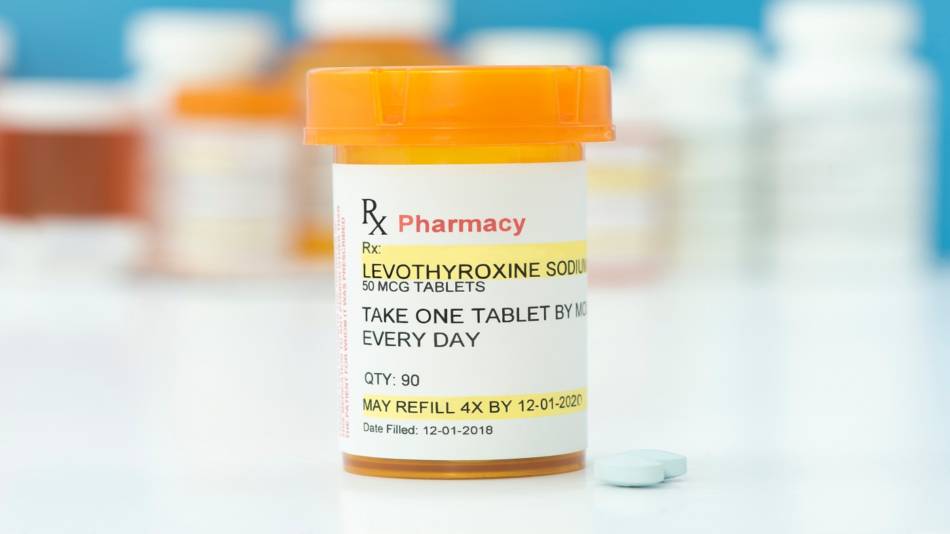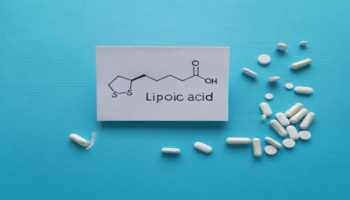Our Members Asked:
I take levothyroxine (Synthroid), a thyroid hormone to treat hypothyroidism. Are there supplements or foods I should avoid, or be taking, due to this drug?

Answer:
Levothyroxine (Synthroid, Levoxyl), liothyronine (Cytomel), and other thyroid hormone drugs for hypothyroidism (underactive thyroid), can be affected by taking supplements and can affect your ability to absorb certain vitamins and minerals. Care must be taken with regard to using these supplements, for the reasons noted below.
Be aware that absorption of thyroid hormone drugs can also be affected by malabsorptive conditions like bariatric surgery, lactose intolerance, celiac disease, and inflammatory bowel disease. Treating hypothyroidism in people with these conditions may require a higher dose of thyroid hormone, but using liquid formulations or following a gluten-free diet (for celiac disease) may improve absorption and reduce the need for higher doses (Asamoah, Clin Case Rep 2021; Fallahi, Front Endocrinol (Lausanne) 2021).
Supplements that affect the absorption of thyroid hormone drugs
Calcium supplements can inhibit the absorption of levothyroxine, and for this reason, should be taken at least four hours after taking levothyroxine, or longer, if taking high doses of calcium (i.e., more than 500 mg). Certain levothyroxine formulations might reduce this effect (see below).
Similarly, iron supplements may interfere with absorption of levothyroxine. It's recommended to take iron supplements at least four hours apart from this drug.
Antacids containing aluminum hydroxide and magnesium hydroxide (such as Maalox), or laxatives containing magnesium oxide, should be taken at least four hours before or after taking levothyroxine, as they may delay or prevent the absorption of the drug by reducing gastric acidity (Synthroid Prescribing Information 2017; Mersebach, Pharmacol Toxicol 1999). Intake of other forms of magnesium should also be separated from levothyroxine by 2 to 4 hours, as the magnesium from these salts may bind to and reduce the absorption of levothyroxine (Vitic, Can Fam Physician 2023).
Liquid formulations of levothyroxine, or possibly softgels, might reduce this effect, but should still be taken apart from calcium, iron, and magnesium (Vita, Expert Opin Drug Deliv 2017).
Chromium picolinate may reduce the absorption of levothyroxine based on preliminary evidence in people, but clinical research is needed to confirm. Nevertheless, it may be prudent to consider taking chromium picolinate at least 4 hours apart from levothyroxine.
Soy (including soy protein powders and soy isoflavones -- found in some menopause supplements) can affect absorption of thyroid hormone drugs.
Taking vitamin C along with levothyroxine may increase the absorption of levothyroxine and reduce TSH levels. Although there is no recommendation to avoid vitamin C when taking levothyroxine, people on a stable dose of levothyroxine should talk to their doctor before starting to take vitamin C.
Vitamin D supplementation, alone or in addition to taking levothyroxine, may modestly decrease TSH and levels of certain thyroid antibodies, in people low blood levels of vitamin D. However, be aware that high-dose vitamin D may increase the risk of autoimmune thyroid disease in people who already have sufficient levels of vitamin D.
Supplements that affect thyroid function or levels of thyroid hormone
Alpha-lipoic acid may lower levels of thyroid hormone T3 and increase levels of TSH.
L-carnitine and acetyl-l-carnitine can inhibit the activity of thyroid hormones (and may actually help people with hyperthyroidism, or overactive thyroid).
There is some evidence that kelp supplements (such as tablets and capsules) can increase levels of TSH (thyroid-stimulating hormone).
Although often promoted for thyroid health, iodine supplements will not help your thyroid work better, and may even cause problems, unless you have an iodine deficiency.
Preliminary evidence suggests that ashwagandha may increase thyroid hormone levels, and so should be used with caution in people taking thyroid hormones, or people with hyperthyroidism.
Resveratrol has been shown to increase TSH levels and cause thyroid enlargement in animals, although it's not known whether it effects thyroid function in people.
Long term exposure to high or even moderate amounts of lithium can affect thyroid function.
Be aware that some thyroid-boosting supplements, including herbal supplements, have been found to contain thyroid hormones at significant levels, which are not listed and may be due to drug spiking. See the details in our Warnings section.
Supplements affected by thyroid hormone drugs
Levothyroxine may prevent the metabolism, and thus increase blood levels, of cannabidiol (CBD). Levothyroxine can inhibit cytochrome p450 enzyme CYP3A4, which metabolizes CBD in the body. A small study found that children taking CBD who were also taking levothyroxine had higher blood levels of CBD compared to those taking the same dose of CBD but without levothyroxine. Other experts have cautioned that, theoretically, co-administration of CBD and levothyroxine may increase blood levels and, consequently, the effects of levothyroxine, leading to symptoms of hyperthyroidism, although this interaction has not been reported in humans.
Supplements that affect thyroid hormone test
Be aware that high doses of biotin (as found in some B-complexes or supplements for hair and nails) may interfere with certain thyroid laboratory tests.
Foods that affect thyroid hormone absorption
Soybean flour, cottonseed meal, walnuts, and dietary fiber may bind and decrease the absorption of levothyroxine from the gastrointestinal tract.
Grapefruit juice may delay the absorption and reduce its bioavailability (Synthroid Prescribing Information 2017).
There is also some evidence that coffee may bind to and reduce the absorption of levothyroxine. Consequently, it may be best to wait one hour after taking this medication before drinking coffee (Benvenga, Thyroid 2008; American Thyroid Association). It is not known which compound/s in coffee are responsible for this effect. Therefore, it is possible (but not proven) that decaffeinated coffee may also reduce absorption (Wegrzyn, J Acad Nutr Diet 2016). [Note: A small, company-funded study suggests that absorption of a liquid oral formulation of levothyroxine (Thyquidity, VistaPharm, Inc. ) was not affected when taken 5 minutes after consuming 8 ounces of coffee (without cream or sugar), but this study does not appear to have been published in a peer-reviewed journal to-date, and prescribing information for the product currently states it should be taken on an empty stomach, although coffee is not listed under potential food interactions). In addition, these findings cannot be applied to the more common, tablet formulations of levothyroxine, such as Synthroid.]
Taking levothyroxine along with cow's milk, which contains calcium, can decrease the absorption of levothyroxine by about 8% (Chon, Thyroid 2018).
Green tea may also interfere with thyroid hormones, so it may be best to consume green tea, as well as green tea supplements, at least one hour apart from thyroid medication.
There is some evidence that coffee, milk and tea may have less effect on the absorption of liquid formulations of levothyroxine, or possibly softgels, than tablet forms (Liu, Ther Clin Risk Manag 2023; Cappelli, Case Rep Endocrnol 2020), although more research is needed to confirm.
Foods that affect the thyroid function
Cruciferous vegetables such as broccoli, brussels sprouts and cabbage contain compounds that can interfere with thyroid function. However, these compounds are typically found in only very small amounts in these vegetables, and they appear to be deactivated upon cooking (McMillan, Hum Toxicol 1986; Felker, Nutr Rev 2016). See our Answer about supplements and thyroid function for details.
Many reviews have investigated a possible association between fluoride exposure and thyroid dysfunction (including risk of hypothyroidism). However, best available evidence suggests that fluoride intake from drinking water does not have an adverse effect on the thyroid gland or its function. There is no evidence that fluoride intake from other sources such as toothpaste (which is less than the amount from drinking water) affects thyroid function.
When to take levothyroxine
Although it is often recommended that levothyroxine be taken on an empty stomach about 30 to 60 minutes before breakfast, and, as noted above, at least 60 minutes before drinking coffee, some people find it difficult to consistently take this medication in the morning. Interestingly, some studies have shown that taking levothyroxine in the evening can be just as effective in controlling hypothyroidism as taking it in the morning, and in some cases, may even improve absorption (Pang, Clin Endocrinol (Oxf)2020; Mello, Front Med (Lausanne) 2022), although people who wish to try this should still consult with their physician before making this change. The American Thyroid Association's guidelines state that levothyroxine can be taken at bedtime (at least 3 hours or more after the last meal) as an alternative to taking it in the morning, and that doing this can achieve optimal, consistent absorption.
Although some people have raised concerns that taking levothyroxine at night could cause or worsen insomnia, this does not appear to be reported as a side effect in clinical trials in which the drug is taken at night. In addition, insomnia associated with use of levothyroxine taken in the morning occurs primarily when taken at a higher dose than needed (Synthroid Prescribing Information 2017). It's also worth noting that hypothyroidism itself has been linked to difficulty sleeping in some (but not all) research, possibly due to symptoms such as muscle pain and cold intolerance interfering with sleep, and other clinical symptoms, such fatigue, often improve with treatment.
About generic versions of levothyroxine
The reason why it's particularly important to consider possible supplement interactions when taking thyroid medication is that it has a "narrow therapeutic index." This means that drug levels must be maintained within a relatively narrow range to be effective and not cause side effects. For this same reason, switching from a branded thyroid medication to a generic, or from one generic to another, can be problematic if the two drugs are not closely bioequivalent or are formulated differently -- causing one to release its active ingredient at a different rate than the other under certain circumstances, such as when taken with food or without food.
Due to historic concerns with generic versions of thyroid medication, the FDA tightened the bioequivalency requirements on generics in 2007. Nevertheless, many physicians have continued to prescribe the branded versions. In a study funded by the FDA to validate the equivalency of generic drugs, researchers reviewed the medical records of thousands of people newly started on generic (Mylan, Sandoz, or Lannett) or branded (primarily Synthroid or Levoxyl) levothyroxine for mild hypothyroidism between 2008 and 2017. They found similar attainment of normal thyroid status regardless of whether generic or brand-name medicine had been administered (Britto, JAMA Network Open 2020). While this is encouraging, it should be noted that the study did not evaluate the effects of switching from branded to generic (or generic to branded) products, nor did it include patients with moderate or severe hypothyroidism. In addition, there have been recalls of generic thyroid medication found to be subpotent or superpotent.
Join today to unlock all member benefits including full access to all CL Answers and over 1,400 reviews.
Join NowAlready a member? Sign In Here.
Join now at www.consumerlab.com/join/

















Submit your comment
This feature is restricted to active members.
Join now to add comments and get all member benefits, including over 1,400 reviews.
Join NowAlready a member? Sign in here.